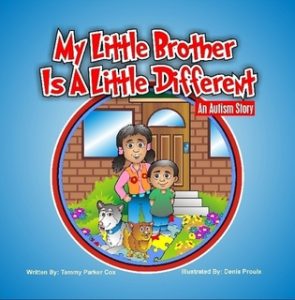Published on: December 30, 2017
Autism. A word that comes with many questions, concerns, doubts, fears of the unknown and the future. To parents with a child on the spectrum, it’s an ever evolving way of thinking of what the next steps will be and how will this effect their other children. Unfortunately, there is that side of Autism that comes with rituals, routines or even aggressive behaviors that can be hard to explain to the other siblings. With that being said, the question still remains for some families and that is, how do you talk to your neuro-typical children about their sibling’s behavior?
What seems to be a consistent answer among those families trying to have those talks is honesty. Families believe it’s important to talk to your child about how their sibling’s disorder will affect them. At every stage of their development, there will be new challenges to face, and there is no way around the fact that this will affect everyone in the family in one way or another. The older your child gets, the more aware they become of just how different they may be from their sibling. It can also work the same way with parents being honest with when they are feeling frustrated, or in a bad mood. Being able to honestly share your own feelings opens the door for your child to do the same. This type of communication also allows them the freedom to ask questions that may be considered inappropriate, rude, or inconsiderate in other circumstances. Your child needs answers as much as you do. They may have different questions or feelings, but they are legitimate. Acknowledging their emotions and questions can help them cope and understand.
Another effective way families talk to sibling(s) is by using books as a resource. Books on autism are some of the best tools for helping younger children understand why their brother or sister is different. Here are a few:
- My Little Brother is Different – An Autism Story by Tammy Parker Cox
- My Brother Charlie by Holly Robinson Peete and Ryan Elizabeth Peete
- Tacos Anyone? An Autism Story by Marvie Ellis and Jenny Loehr
- My Brother has Autism by Debbie Jaeger and Bobbi Hixson
Reading an age appropriate book and then discussing it with your child will give them a chance to ask questions and begin to conceptualize the issue of autism in the abstract, which can help to lead to a better understanding and in turn have empathy for those with a diagnosis.
Another way to help your neuro-typical children understand, is to let them hear from other families going through similar experiences in a support group setting. Sometimes your child needs to hear it from someone else. Raising a child with autism will challenge even the most prepared parent. The same will be true for your neuro-typical child. They are going to experience things that will make life different, and often difficult. Support groups for families dealing with autism can be very helpful. It allow you and your other family members to share experiences and stories, you may also pick up tips from other parents who are a bit further down the road who can offer words of wisdom based on their own experiences. Hearing from someone their own age about how they feel embarrassed or frustrated can help relieve feelings of guilt and anger in your child. It can also help your child feel less alone when they know there are other kids like them experiencing the same things. Mount Washington Pediatric Hospital offers Sibshops in the spring, summer, and fall for siblings ages eight to 13 and in the spring for siblings ages four to seven. The purpose of Sibshops is to allow children who are siblings of children with special needs to have an outlet to discuss the positives and negatives to having a sibling with special needs. The group uses play and games to teach siblings team building, positive self-awareness, disability awareness, and facilitates discussions about the joys and challenges of having a sibling with special needs. In addition, the Baltimore Autism Society has autism support groups that meet the first Thursday of every month throughout the year. Although this is mainly a parent support group; break out sessions are occasionally scheduled for teen siblings as well. The groups meet in the 3rd floor board room of Mount Washington Pediatric Hospital, 1708 W. Rogers Avenue, 21209.
The main thing to remember when starting any conversation with your child’s siblings is to make sure the discussion is on-going because their needs, like your, will change! Even though there may be isolated points of time that you are discussing something with your child that is autism related, does not mean that the discussion ends there. Each day brings about new and unique occurrences between your child with autism and their siblings, talking about what is going on will help build understanding.
Every family dynamic is different, so how you start the talk will vary across different families but taking the time to talk to your other children about the positives and challenges about having a sibling with autism will help them to understand and relate to their sibling.
By Erin Richmond
For more information about The Shafer Center contact 410-517-1113 or [email protected]
